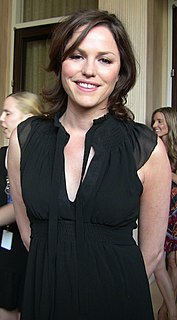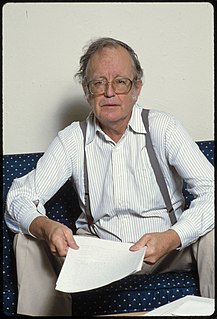A Quote by Jorja Fox
I think 'Make love, not war' might be the most profound statement that's ever been made.
Related Quotes
Unlike most wars, which make rotten fiction in themselves - all plot and no characters, or made-up characters - Vietnam seems to be the perfect mix: the characters make the war, and the war unmakes the characters. The gods, fates, furies had a relatively small hand in it. The mess was man-made, a synthetic, by think tank out of briefing session.
In terms of scripted shows, I love 'Mad Men.' Cinematically, it's one of the most beautiful shows ever made. I love the subtlety of the acting and the storytelling, and I love that they don't think the audience is dumb. They make a great show, and you figure it out, and it leaves you with so many questions - it's just great.
Have you ever noticed that the only metaphor we have in our public discourse for solving problems is to declare war on it? We have the war on crime, the war on
cancer, the war on drugs. But did you ever notice that we have no war on homelessness? You know why? Because there's no money in that problem. No money to be made off of the homeless. If you can find a solution to homelessness where the corporations and politicians can make a few million dollars each, you will see the streets of America begin to clear up pretty damn quick!
Here is my challenge. Name one ethical statement made, or one ethical action performed, by a believer that could not have been uttered or done by a nonbeliever. And here is my second challenge. Can any reader think of a wicked statement made, or an evil action performed, precisely because of religious faith? The second question is easy to answer, is it not? The first - I have been asking it for some time - awaits a convincing reply. By what right, then, do the faithful assume this irritating mantle of righteousness? They have as much to apologize for as to explain.
I always thought love made you stupid. Made you weak. A bad Shadowhunter. 'To love is to destroy.'I believed that[...]I used to think being a good warrior meant not caring,[...] And then I met you. You were a mundane. Weak. Not a fighter. Never trained[...] Love didn't make you weak, it made you stronger than anyone I'd ever met. And I realized I was the one who was weak.
We were deliberately designed to learn only by trial and error. We're brought up, unfortunately, to think that nobody should make mistakes. Most children get de-geniused by the love and fear of their parents - that they might make a mistake. But all my advances were made by mistakes. You uncover what is when you get rid of what isn't.
I doubt if these two fine, active minds [President and Mrs. Roosevelt] have ever inquiried how it is they know what they know and think as they do. Nor have they ever thought of what they might have been if they had grown up in an entirely different culture. They have the disposition of all politicians world over to deal only with made opinion. They have never inquired how it is that opinion is made.
Language is not made to be believed but to be obeyed, and to compel obedience newspapers, news, proceed by redundancy, in that they tell us what we ‘must’ think, retain, expect, etc. language is neither informational nor communicational. It is not the communication of information but something quite different: the transmission of order-words, either from one statement to another or within each statement, insofar as each statement accomplishes an act and the act is accomplished in the statement




































